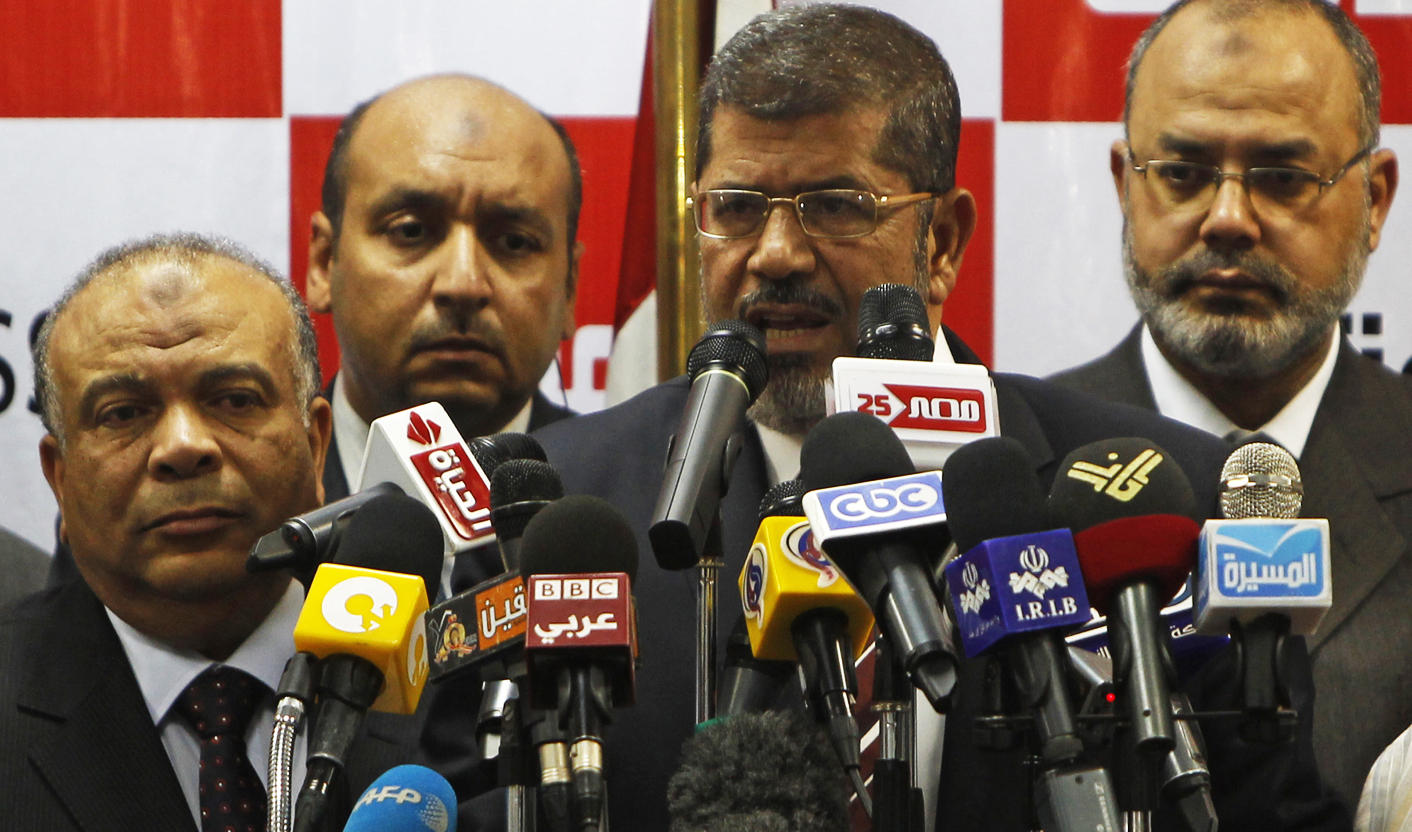The Muslim Brotherhood have been more adept at collating results than Egyptian state authorities. Their numbers claim their candidate Mohammed Morsi won 13,237,000 votes while his rival Shafiq amassed12,338,973 votes. Accordingly, Morsi becomes the next president by 52% to Shafiq’s 48% of the vote.
The Brotherhood has wasted no time declaring a winner. Morsi has already given a victory speech – reaching out to all the factions of Egyptian society, including secularist and Christians, but Shafiq’s campaign is livid at what they claim is a pre-emptive declaration of victory.
The Brotherhood, however, has been unfazed.
Egyptian analysts point out that while the Brotherhood certainly have some interest in declaring victory early, they do have the most sophisticated result-collating system in the country. The Brotherhood’s spokespeople have been at pains to point out that their official numbers in first round were “matched exactly” with the final numbers from the electoral commission. By declaring their candidate the next president of Egypt, the Brotherhood have issued a stern challenge to the ruling military council; should they declare Shafiq president, there will be hell to pay.
For more than a year, the prospect of a Brotherhood president has been fretted over. It’s implications on life in Egypt have been debated over and over again. The fear of Islamists gaining power have somehow paled against the reality of Egypt’s military trying hard to preserve its power.
To date, there has been a growing disillusionment with the political spectacle in Egypt. The Supreme Council of the Armed Forces (Scaf) has ruled Egypt for 18 months now. When they first arrived in Tahrir Square, purportedly unbiased and ready to protect civilians, they were met with chants like “The people and the army are one”.
Some months down the line, however, Egyptians lost heart and hope in the military’s readiness to oversee real transformation. It was still the military and not the people who held the ultimate power. Scaf has played president for the past year and a half and, after overseeing the dissolution of the Egyptian parliament, they now appear set to shift and play the role of the legislature until a new one is elected.
Scaf decided to dissolve parliament based on a ruling by Egypt’s Supreme Constitutional Court last Thursday that held the law governing the parliamentary elections, which ended in January, erred when it allowed parties to contest the seats reserved for independents.
After apparent acquiescence to the ruling initially, the Muslim Brotherhood’s Freedom and Justice Party said in a statement on Saturday evening that the military had no right to order the dissolution of parliament. They insist such a decision can only come through a national referendum. The statement is then a challenge to Scaf, which has sent soldiers to the assembly building to prevent members of parliament from entering.
“The constant threat to dissolve a parliament elected by the will of 30 million Egyptians confirms the Supreme Council of the Armed Forces’ desire for a total power grab against the popular will,” said the FJP in a statement that called the ruling a “blatant attack on the great Egyptian revolution”.
The decision to dissolve parliament was met with shock and outrage but there were also a good many Egyptians smug to have been proven right, confident that Scaf simply will not allow real change. On cue, a report emerged on Sunday, revealing exactly how far Scaf would go to ensure their power in Egypt. According to the report, a “constitutional annex” will be announced by Tuesday, awarding the new president the power to appoint the prime minister, ministers and their deputies, state representatives at home and abroad, civil servants, military attaches and diplomats.
The new president will also be able to grant pardons (Mubarak may then be warmed by the prospect of having an old pal in power). Crucially, however, Scaf will not be handing over all its power to the civilian government. It will retain the legislative role until such time as a new parliament is elected. It will also preserve the right to approve the general budget.
All this as a court case scheduled for Tuesday seeks to freeze the brotherhood’s activities because it is not registered under the law as non-governmental organisations in Egypt are required to do. So even if the brotherhood’s candidate is declared president, celebrations may be thwarted by the court disbanding the organisation altogether.
These political pyrotechnics may be better understood in the words of the old master, Franz Kafka: “Every revolution evaporates and leaves behind only the slime of a new bureaucracy.” Yet in Egypt, what is becoming increasingly clear is that Mubarak was only the head of a system in which the military was implicit.
In March last year, Egyptians voted in a referendum that would see the country host a presidential election sooner rather than later. That first tentative step towards democracy saw scenes reminiscent of South Africa in 1994. Egyptians brandished thumbs marked with a spot of pink ink like flags of victory, excited to finally have a say on the country’s future.
The referendum returned a resounding victory for the “Yes” factions of Egyptians society, paving the way for presidential elections this year. And yet, that presidential election has found Egyptians disillusioned, dissatisfied and entirely disenchanted with the choices offered to them. That first referendum saw a turnout of nearly 80% but every election since – there have been parliamentary elections and two rounds of presidential elections - have seen turnout dwindle to a trickle.
No matter the result, no matter who the president is, Egyptians may have to find the strength to begin their fight all over again. DM
Read more:
- Egypt's presidential election turns toxic amid anger over 'stolen revolution' in The Guardian
- Egypt military to consolidate power in Financial Times
Photo: The Muslim Brotherhood's presidential candidate Mohamed Morsy (C) talks during a news conference in Cairo June 18, 2012. Morsy said on Monday after his group declared him winner in a presidential race that he would be a president for all Egyptians and said he would not "seek revenge or settle scores." He was speaking at a news conference after the Brotherhood declared he had won 52.5 percent of the vote compared to the 47.5 percent secured by his rival, ex-military man Ahmed Shafik, with almost all votes counted. Shafik's campaign challenged the result. REUTERS/Amr Abdallah Dalsh





